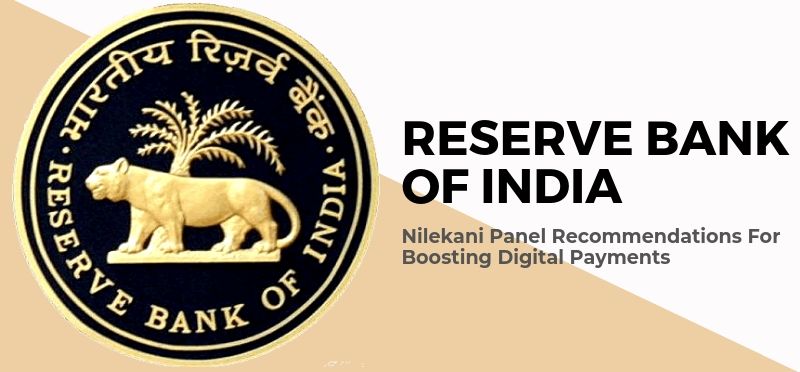
The Nandan Nilekani led RBI committee on digital payments has given a slew of recommendations to increase digital payments in the country.
In-Detail
- The committee was constituted by the RBI to suggest ways to boost digital payments in the country.
- It has submitted a report titled ‘Deepening Digital Payments in India’ and has given its recommendations.
Committee’s Observations
- As per the committee, digital payments have increased by 10-fold across the country in the last five years and will further see a 10X growth in the next three years.
- This will be driven by high-value low volume and high-cost transactions to low-value, high-volume and low-cost transactions.
- The committee noted that cash is still the king in the economy despite government benefits and salaries in the organised sector being paid digitally.
- It is essentially due to poor acceptance ecosystem for digital payments in the economy and reliance on cash by the unorganised sector of the economy.
- It further noted that the gap between digital credits that the Indian consumer gets while doing a digital transaction and the digital debits that one has to forgo needs to be addressed to increase digital transactions in the country.
The Recommendations
- The committee suggested that the government being the largest player in the payments ecosystem should play an important role in all aspects of digitisation of payments.
- It wants the government to do payments to the citizens only through digital mode.
- All salaries, pensions, DBT transfers, payments for goods and services must be done digitally.
- Also, the committee wants the threshold for small value cash transaction should be bought to Rs. 1000 in the next year.
- It wants the government to launch an e-wallet where small value payments, refunds, rebates/loyalty bonus, etc can be credited which intern can be used for making payments to the government.
- The committee recommended that all government departments and public sector undertakings must provide digital payments as an alternative to the consumers purchasing various services or payments like water bills, electricity bills, gas bills, tax payments, etc.
Acceptance Development Fund
- For the RBI, the committee has suggested forming an Acceptance Development Fund (ADF) to develop new merchants in the poorly digitised regions.
- It also suggested that the government should provide tax discount for the business in lieu of the digital transactions done by the business.
- By doing this, the committee hopes that digital transactions become cheaper than cash and this is what happened in South Korea.
- In general, the Merchant Discount Rate (MDR) and the interchange rate are determined by the market forces. Since this is not happening in India, the committee wants the interchange rate on card transactions to be reduced by 15 basis points.
- It also called on the RBI to increase the time for transactions via RTGS and NEFT.
Stress on NCMC
- It has proposed the usage of National Common Mobility Card (NCMC) which is interoperable across transportation means across the country.
- As per the committee, the NCMC has two components to it – i) it can be used as a debit card to be used in an ATM to withdraw money and ii) it can act as a local wallet that can be used as a contactless payments without the need for going back to a server or additional authentication.
- For the rapid acceptance of the card, the committee suggested that all bus, train and metro services must be enabled to accept these payments.
- Also, the government needs to subsidise this for a one-time cost.
- On issuance of the card, the panel suggested that the regular debit cards be enabled with the functionality and replace the existing debit cards on demand by the customer or through a regular cycle.
- It has also called for enabling the mobile devices to have NFC technology with which the need for a card can be dropped.
Also, read:
- Jal Shakti Ministry – A Revamped Ministry To Handle Water-Related Issues
- India’s Gender Inequality Came To The Fore Again
- Election Commission Recommendations Still Await Approval
Conclusion
- Digital transactions have many benefits from reducing the cost of handling cash to increasing tax compliance etc.
- Promoting digital transactions is thus imperative for the government.
- Already, the government launched the UPI system has seen a rise in transactions volumes. Even people in small towns are adopting the payment mode.
- With the right incentives, the government can give a big boost to digital payments and the committee has given the right recommendations to do it.
- But the big question is, how will the government overcome digital illiteracy among the masses to bring out a digital payments revolution?

Leave a Reply
You must be logged in to post a comment.